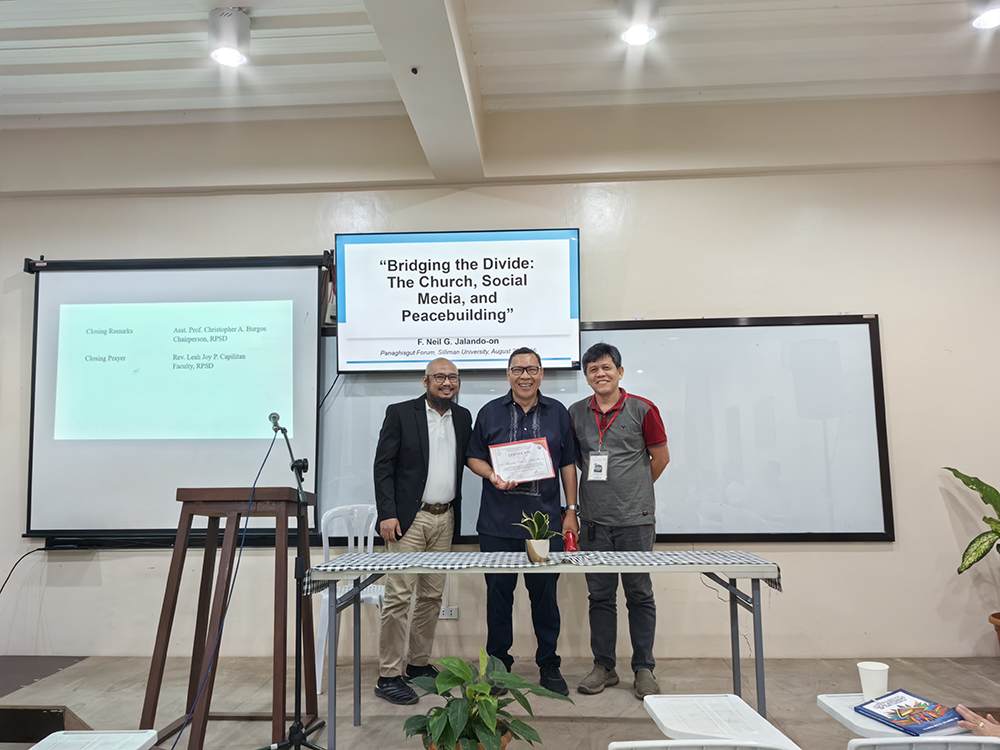By Karren Jay G. Asgar
Rev. Dr. Francis Neil Gico Jalando-on, Office of Communications Director, serves as the guest speaker at the Panaghisgut forum during the 64th Church Workers Convocation of Silliman University Divinity School on August 28, 2025, at Magdamo Hall, Dumaguete City, where he expounded on the theme “Bridging the Divide: The Church, Social Media, and Peacebuilding.”
Rev. Dr. Francis Neil Gico Jalando-on, Director of the Central Philippine University Office of Communications, spoke at the Panaghisgut forum as part of the 64th Church Workers Convocation of Silliman University Divinity School on August 28, 2025, at Magdamo Hall, Dumaguete City. Themed “Rereading the Scriptures in a Fragmented World,” this year’s convocation was organized by the Department of Religion and Peace Studies.
Panaghisgut is a platform designed to foster dialogue between the Church and society on pressing social issues. The forum seeks to examine the Church’s role in the digital age by looking into both the benefits and challenges of social media in promoting peace and unity. It also provides a space for dialogue on how faith communities can address issues such as online hate, misinformation, and division, while exploring ways to harness social media as a constructive tool for advancing the Church’s mission of peacebuilding.
The session opened with welcome remarks from Rev. Dr. Lope B. Robin, Dean of the Silliman University Divinity School (SUDS. Afterward, Rev. Dr. Francis Neil Gico Jalando-on delivered his address on this year’s theme, “Bridging the Divide: The Church, Social Media, and Peacebuilding”.
He emphasized that the pressing concern for today’s faith communities is not whether to use social media but how to use it meaningfully and responsibly. “The same roads that carry fake news can also carry the Good News of Salvation in Jesus Christ. The same platforms that divide can also unite,” he shared.
He discussed the digital divide in a fragmented world and outlined the positive impacts of social media, such as community building, connecting communities, rapid mobilization, amplifying voices for justice, creative evangelism, and wider access to resources. At the same time, he acknowledged the negative consequences, including misinformation and fake news, online hate and cancel culture, echo chambers, digital addiction, shallow engagement, and the distortion of truth.
As part of his message, Rev. Dr. Jalando-on highlighted the Church’s role in peacebuilding and proclaiming the whole Gospel in both physical and digital spaces. He proposed strategies for the constructive use of social media, including education, dialogue, and counter-narratives that challenge misinformation.
In discussing the challenges and opportunities, he noted that while social media can deepen divisions and distract people from genuine human connection, it also provides unprecedented opportunities for the Church to innovate in its mission, strengthen relationships, and creatively communicate the Gospel message.
In his conclusion, Rev. Dr. Jalando-on urged attendees to embrace their role as digital witnesses, emphasizing the importance of social media as a platform for proclaiming peace and unity. He reminded them that, “We, as pastors, are shepherds not only in the physical church but also in the digital space. The flock is browsing online as much as they are sitting in pews. And wolves also roam online. We must be there; not as combative warriors, but as gentle peacemakers.”
Participants also shared their perspectives and experiences, reflecting on how Rev. Dr. Jalando-on’s insights inspired them to use social media more responsibly in their ministries. Ms. Gloria Gem Lumayag, Governor of Silliman University Divinity School Student Assembly remarked, “As someone from Gen Z who works both in social media and the church, I feel seen and heard. I appreciate how this study explores the way we live, communicate, and engage online. I even find it funny sometimes how my everyday life on social media is being studied as if I’m some unknown specimen. Yet the data gathered from this research has helped me a lot, both as an intern pastor and as a social media marketer, especially when handling the youth in my internship church.”
Another participant, Rev. January Alpuerto, Deputy Conference Minister of Negros District Conference, reflected on how Rev. Dr. Jalando-on’s talk highlighted the role of digital ministry. He shared, “One way or another, people noticed that people can see what we are doing, sharing, and promoting online. The best way is to have a healthy approach to engage in order to generate a more positive response towards unity and harmony. We can listen to each other so we can respond better.”
The session concluded with closing remarks from Asst. Prof. Christopher A. Burgos, Chairperson of the Department of Religion and Peace Studies.
For the Centralian community, Rev. Dr. Jalando-on’s participation in the said forum stands as a testament to its enduring commitment to Scientia et Fides, shaping leaders who not only excel in their fields but also use their voices and influence to foster truth, unity, and peace in an ever-changing world.

